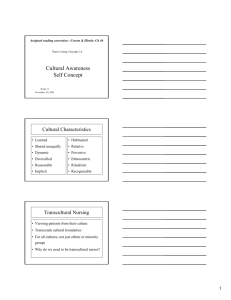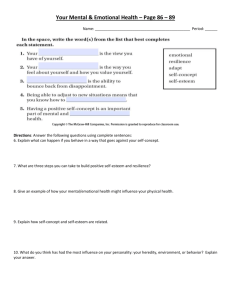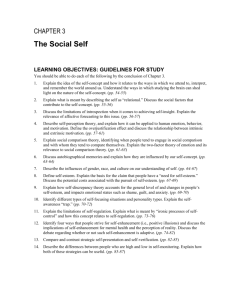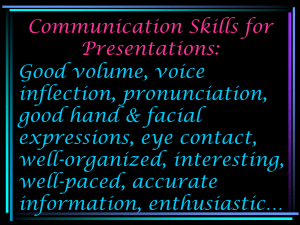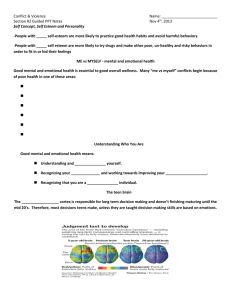File
advertisement
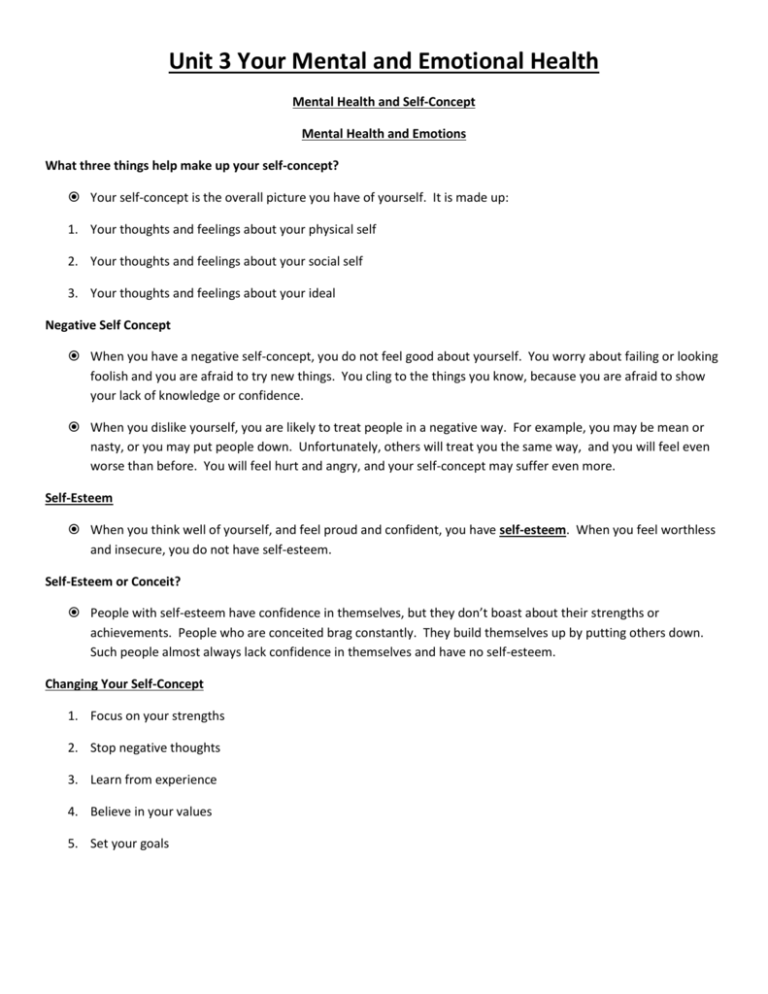
Unit 3 Your Mental and Emotional Health Mental Health and Self-Concept Mental Health and Emotions What three things help make up your self-concept? Your self-concept is the overall picture you have of yourself. It is made up: 1. Your thoughts and feelings about your physical self 2. Your thoughts and feelings about your social self 3. Your thoughts and feelings about your ideal Negative Self Concept When you have a negative self-concept, you do not feel good about yourself. You worry about failing or looking foolish and you are afraid to try new things. You cling to the things you know, because you are afraid to show your lack of knowledge or confidence. When you dislike yourself, you are likely to treat people in a negative way. For example, you may be mean or nasty, or you may put people down. Unfortunately, others will treat you the same way, and you will feel even worse than before. You will feel hurt and angry, and your self-concept may suffer even more. Self-Esteem When you think well of yourself, and feel proud and confident, you have self-esteem. When you feel worthless and insecure, you do not have self-esteem. Self-Esteem or Conceit? People with self-esteem have confidence in themselves, but they don’t boast about their strengths or achievements. People who are conceited brag constantly. They build themselves up by putting others down. Such people almost always lack confidence in themselves and have no self-esteem. Changing Your Self-Concept 1. Focus on your strengths 2. Stop negative thoughts 3. Learn from experience 4. Believe in your values 5. Set your goals Helping Others Improve Their Self-Concept You can have a positive or negative effect on people around you. Reaching out to other people will make them feel good about themselves and also make you feel better about yourself. You can: 1. Be friendly 2. Give a compliment or praise 3. Express negative feelings in a positive way 4. Show people you care Mental Health and Emotions What are feelings? Your feelings or emotions are your reactions to the world around you. For example; things that happen, the way other people treat you, the weather, successes and failures. New hormones in your body are responsible for sudden changes in moods and feelings. Expressing Feelings Some people keep their emotions trapped within themselves. As a result they ten to suffer from stress and may end up with physical symptoms such as; Headache Stomach pain Healthy Ways to Deal With Feelings 1. Talk about your feelings with yourself someone you trust with the person you are having problems with 2. Express your feelings 3. Become Active 4. Work on your problems Insomnia Insomnia – difficulty falling asleep and difficulty staying asleep. Three main causes for insomnia among teens: 1. Physical – allergies, asthma 2. Psychological – anxiety, depression 3. Lifestyle – irregular bedtimes, daytime naps To Help You Sleep 1. Do nothing in bed, just try to sleep 2. Keep a warm body and a cool bedroom 3. Try to keep a regular bedtime and waking time 4. Try not to nap during the day 5. Try to think about pleasant things just before sleep 6. Get rid of anger or worries before going to bed 7. Slow down and relax a half hour before bedtime 8. Drink a glass of hot milk just before bed Depression Feeling sad and discouraged Sometimes it is because of how others treat us It could be because of an unhappy experience Often caused by lack of self-esteem It could be caused by chronic illness Failure to achieve goals Stress of being a teenager Peer pressure Chemical imbalances Signs of Depression Sadness Lack of appetite or overeating Sleeping too much or too little Loss of enthusiasm Loss of ability to concentrate Withdrawal from family and friends Tiredness Mood swings Irritable , overreactive Coping with Depression 1. Examine the cause of your depression, decide what will make you feel better, and take action! 2. 2. Don’t worry about things you can’t change and work on those that you can. 3. 3. Don’t blame yourself. Getting Help for Deep Depression Talk to; 1. A family member 2. A school counselor 3. A teacher you trust 4. A doctor
